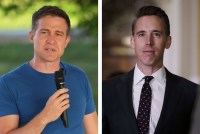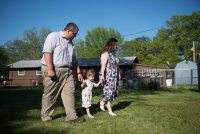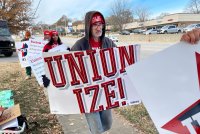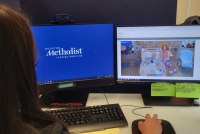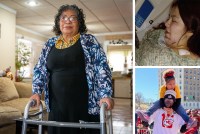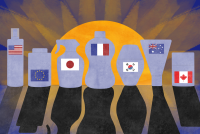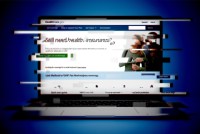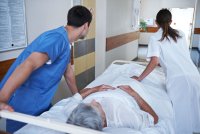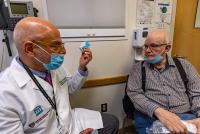Latest Morning Briefing Stories
Why One New York Health System Stopped Suing Its Patients
Most U.S. hospitals aggressively pursue patients for unpaid bills. One New York hospital system decided to work with them instead.
Tribal Nations Invest Opioid Settlement Funds in Traditional Healing To Treat Addiction
Hundreds of Native American tribes are getting money from settlements with companies that made or sold prescription painkillers. Some are investing it in sweat lodges, statistical models, and insurance-billing staffers.
After a Child’s Death, California Weighs Rules for Phys Ed During Extreme Weather
A California lawmaker wants the state to craft guidelines for how and when schoolchildren can play or exercise during extreme weather, including heat waves. The bill comes after a 12-year-old boy died after a physical education instructor told him to run as the temperature topped 90 degrees.
Medicaid ‘Unwinding’ Decried as Biased Against Disabled People
People with disabilities say they are abruptly losing their Medicaid home health benefits and are being advised incorrectly when they call state offices for more information. “Every day the anxiety builds,” one beneficiary told KFF Health News.
Nursing Homes Wield Pandemic Immunity Laws To Duck Wrongful Death Suits
More than 172,000 nursing home residents died of covid. In lawsuits, some families who lost loved ones say they were misled about safety measures or told that covid wasn’t a danger in their facilities.
FDA Said It Never Inspected Dental Lab That Made Controversial AGGA Device
Johns Dental Laboratories stopped making the Anterior Growth Guidance Appliance last year after a KFF Health News-CBS News investigation into allegations of patient harm. The company had “never” reported any complaints about its products to the FDA, according to the agency.
First Responders, Veterans Hail Benefits of Psychedelic Drugs as California Debates Legalization
California lawmakers have modified a psychedelic drug bill that was vetoed last year, narrowing it to allow only supervised use of psilocybin mushrooms, ecstasy, and other hallucinogens rather than decriminalize more broadly. The current bill would establish new state agencies to regulate the program.
San Francisco Tries Tough Love by Tying Welfare to Drug Rehab
Facing an overdose epidemic and public fury over conditions on the streets, famously tolerant San Francisco will start requiring welfare recipients to undergo drug screening, and treatment if necessary, to receive cash public assistance.
Democrats Seek To Make GOP Pay for Threats to Reproductive Rights
Democrats running for office are using abortion rollbacks to galvanize voters, with abortion rights ballot initiatives amplifying their lines of attack. In Missouri, the leading Democratic candidate for the Senate also blames Republican Sen. Josh Hawley for threatening access to IVF.
Their First Baby Came With Medical Debt. These Illinois Parents Won’t Have Another.
Millions of new parents in the U.S. are swamped by medical debt during and after pregnancy, forcing many to cut back on food, clothing, and other essentials.
What the Health? From KFF Health News: Newly Minted Doctors Are Avoiding Abortion Ban States
For the second year in a row, medical school graduates across specialties are shying away from applying for residency training in states with abortion bans or significant restrictions, according to a new study. Meanwhile, Medicare’s trustees report that the program will be able to pay its bills longer than expected — which could discourage Congress from acting to address the program’s long-term financial woes. Lauren Weber of The Washington Post, Joanne Kenen of the Johns Hopkins University schools of nursing and public health and Politico Magazine, and Anna Edney of Bloomberg News join KFF Health News’ Julie Rovner to discuss these stories and more.
Medical Residents Are Increasingly Avoiding States With Abortion Restrictions
A new analysis shows that students graduating from U.S. medical schools were less likely to apply this year for residency positions in states with abortion bans and other significant abortion restrictions.
Paid Sick Leave Sticks After Many Pandemic Protections Vanish
The U.S. is one of nine countries that do not guarantee paid sick leave. Since the covid pandemic, advocates in states including Missouri, Alaska, and Nebraska are organizing to take the issue to voters with ballot initiatives this November.
Forget Ringing the Button for the Nurse. Patients Now Stay Connected by Wearing One.
Dozens of hospitals have deployed a device that uses artificial intelligence to monitor patients remotely. One hospital says it reduces nurses’ workloads — but some nurses fear the technology could replace them.
Three People Shot at Super Bowl Parade Grapple With Bullets Left in Their Bodies
Despite the rise of gun violence in America, few medical guidelines exist on removing bullets from survivors’ bodies. In the second installment of our series “The Injured,” we meet three people shot at the Kansas City Super Bowl parade who are dealing with the bullets inside them in different ways.
Amgen Plows Ahead With Costly, Highly Toxic Cancer Dosing Despite FDA Challenge
The FDA told Amgen to test whether a quarter-dose of its lung cancer drug worked as well as the amount recommended on the product label. It did and with fewer side effects. But Amgen is sticking to the higher dose — which earns it an additional $180,000 a year per patient.
What’s Keeping the US From Allowing Better Sunscreens?
A decade after Congress told the FDA to expedite the approval of more effective sunscreens, the federal government still has not approved sunscreen ingredients that are safely being used around the world. Meanwhile, skin cancer is the nation’s most common cancer.
Biden Team’s Tightrope: Reining In Rogue Obamacare Agents Without Slowing Enrollment
Federal regulators face a growing challenge — how to prevent rogue health insurance agents from switching unknowing consumers’ Obamacare coverage without making the enrollment process so cumbersome that enrollment declines.
Stranded in the ER, Seniors Await Hospital Care and Suffer Avoidable Harm
Many older adults who need hospital care are getting stuck in emergency room limbo — sometimes for more than a day. The long ER waits for seniors who are frail, with multiple medical issues, lead to a host of additional medical problems.
Could Better Inhalers Help Patients, and the Planet?
Puff inhalers can be lifesavers for people with asthma and other respiratory diseases, but some types release potent greenhouse gases that contribute to climate change. That, in turn, worsens wildfires, contributes to air pollution, and intensifies allergy seasons — which can increase the need for inhalers. Some doctors are helping patients switch to more eco-sensitive inhalers.











